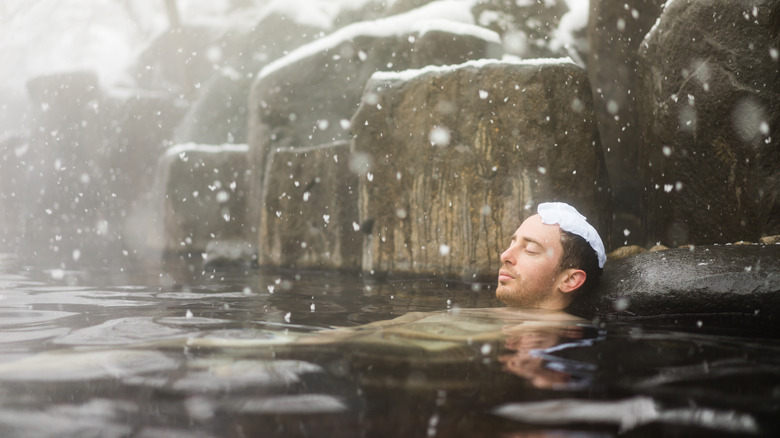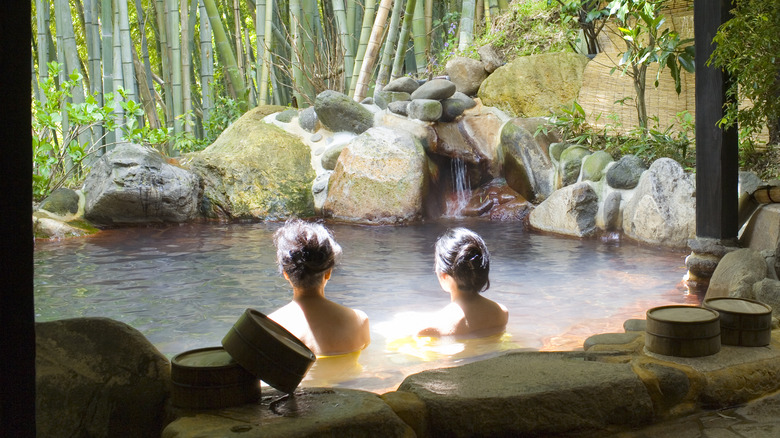The Reason You'll Probably Be Bathing Nude In Traditional Japanese Hot Springs
One of the hottest scenes in FX's historical drama "Shōgun" was when Toda Mariko, the gorgeous samurai woman, walked in on John Blackthorne, the English navigator, as he soaked in a steaming outdoor onsen (Japanese hot spring). Blackthorne was completely nude in the pool and looked a little mortified in front of a woman he was not so secretly pining for as she sat and spoke to him, fully clothed. This onsen scene illustrated the characters' complex dynamics and did a stellar job of showcasing the significance of onsen in Japanese culture.
From admiring the snowy peak of Mount Fuji to sampling snacks in the foodie city of Osaka to roaming the overstimulating, neon-lit streets of Tokyo, Japan offers a kaleidoscope of unique experiences. Add onsen bathing to your Japan bucket list because, as a series of volcanic archipelagos, the country produces some of the world's best naturally occurring hot springs. Onsen is an integral part of Japanese culture for its healing and purification properties. The springs are not only thought to cure ailing aches and pains but are also the most direct way to achieve cleanliness in body and spirit, qualities the Japanese prize. Most onsen bathing areas are separated by sex, and it is expected that you enter the bath unclothed, or, as the idiom says, "naked as the day you are born." No bathing suits or boxer shorts are allowed in the onsen, even if you are shy, as the fabric could introduce dirt and detergent to the pure waters. Channel John Blackthorne and immerse yourself in nature by entering the pool in your birthday suit.
Onsen etiquette to follow in Japan
When you arrive at an onsen, start by removing your shoes (usually in a designated area near the front doors) to avoid trailing dirt into a clean space. Then, head to the changing area and get naked. Sure, the idea of being looked at by strangers can feel weird and uncomfortable, but remember that everyone else is also in the buff. Overcoming the discomfort is worthwhile to enjoy a distinct cultural experience, and you may even feel healed and rejuvenated by the end of your soak. However, if you have visible tattoos, beware. Many onsen resorts will not allow you to enter if you have tattoos, as ink on the skin is associated with the yakuza (Japanese mafia). Be sure to find a tattoo-friendly onsen or risk getting kicked out.
After putting your clothes in the basket or locker provided, walk to the bathing area and wash yourself before entering the pool. Showering before a bath may seem counterintuitive, but it is absolutely necessary to keep the onsen water clean. Small stools are usually off to the side of the onsen so you can sit and wash yourself thoroughly with the soap provided. Rinse off, and be sure not to drag suds into the onsen. Then, enter the pool quietly without splashing around — it's supposed to be a calming experience, after all. Sit as long as you like, but be careful to not soak too long since the water is usually around 104 degrees Fahrenheit and could cause you to overheat.
Now that you know the proper etiquette, head to the serene Nishiyama Onsen Keiunkan, the world's oldest hotel, or the mountain town of Kamikochi for some of the best bathing experiences in Japan. If you've developed an onsen habit and don't live in the Land of the Rising Sun, rest assured. There are luxurious hot springs destinations outside Japan, too.

